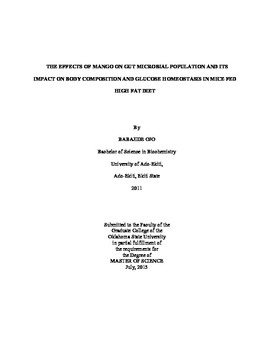| dc.contributor.advisor | Lucas, Edralin A. | |
| dc.contributor.author | Ojo, Babajide | |
| dc.date.accessioned | 2016-09-29T18:41:59Z | |
| dc.date.available | 2016-09-29T18:41:59Z | |
| dc.date.issued | 2015-07-01 | |
| dc.identifier.uri | https://hdl.handle.net/11244/45291 | |
| dc.description.abstract | The gut microbial population is significantly compromised in high fat feeding. These changes are associated with obesity and type 2 diabetes (T2D). Fermentation of non-digestible carbohydrates and fiber from plant food sources are suggested to prevent gut dysbiosis due to high fat feeding. Various parts of mango have been studied for their anti-obesogenic, immunomodulatory and gastroprotective abilities. This study investigated the effects of 12-week freeze-dried mango pulp supplementation on the gut microbiota and its impact on body composition, glucose homeostasis and inflammatory markers in C57BL/6 mice fed a high fat (HF) diet. Male C57BL/6 mice were randomly assigned to 4 dietary treatment groups: Control (AIN-93M, 10% kcal from fat), HF (60% kcal from fat), and HF+1% or 10% mango. Cecal sample analyses by 16S rDNA sequencing show that HF feeding resulted in a significant loss of bacteria, most notably Bifidobacteria and Akkermansia while mango supplementation prevented the loss of these bacteria in a dose-dependent manner similar to control. Mango supplementation did not reduce body weight or fasting blood glucose. Plasma lipids were elevated with HF feeding compared to control, with both mango doses lowering plasma triglyceride. The HF+10% mango significantly lowered plasma non-esterified fatty acids but increased plasma total cholesterol. In comparison to the HF group, a dose-dependent increase in microbial fermentation was observed with mango supplementation, as evident in increased fecal and cecal acetic and butyric acid but not propionic acid. Furthermore, mango supplementation modulated gut inflammation, as observed with an increase in ileal and colonic IL-10 gene expression compared to the HF group. These results demonstrate that mango supplementation in high fat feeding modulated some of the adverse effects that accompanies high fat diet-induced obesity. | |
| dc.format | application/pdf | |
| dc.language | en_US | |
| dc.rights | Copyright is held by the author who has granted the Oklahoma State University Library the non-exclusive right to share this material in its institutional repository. Contact Digital Library Services at lib-dls@okstate.edu or 405-744-9161 for the permission policy on the use, reproduction or distribution of this material. | |
| dc.title | Effects of Mango on Gut Microbial Population and Its Impact on Body Composition and Glucose Homeostasis in Mice Fed High Fat Diet | |
| dc.type | text | |
| dc.contributor.committeeMember | Smith, Brenda J. | |
| dc.contributor.committeeMember | Clarke, Stephen | |
| osu.filename | Ojo_okstate_0664M_14212.pdf | |
| osu.accesstype | Open Access | |
| dc.description.department | Nutritional Science | |
| dc.type.genre | Thesis | |
